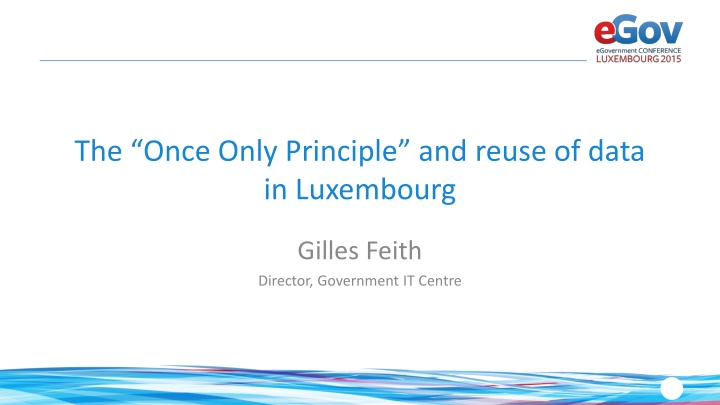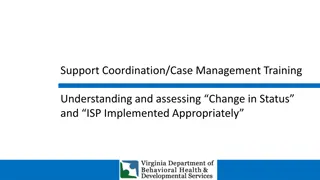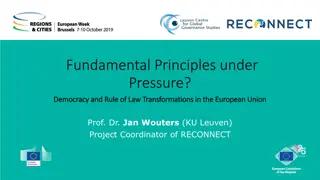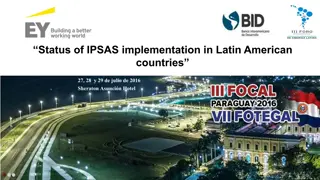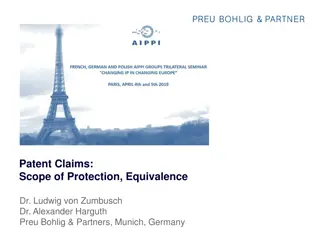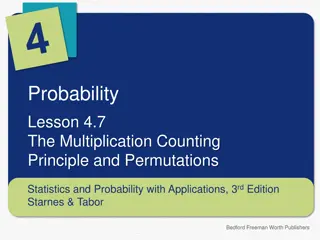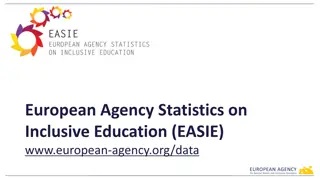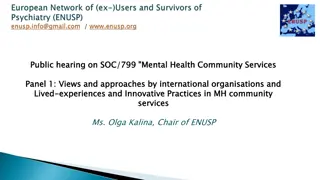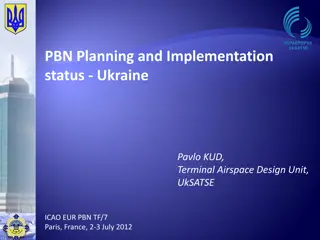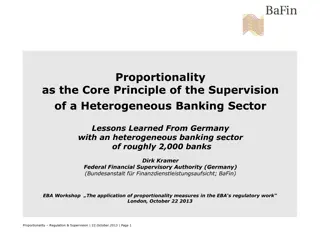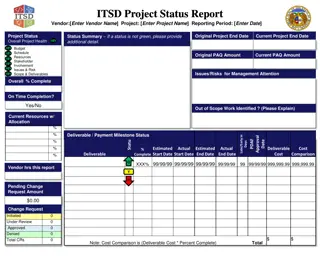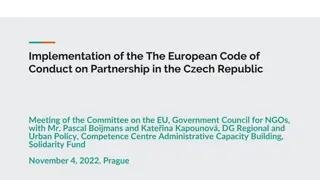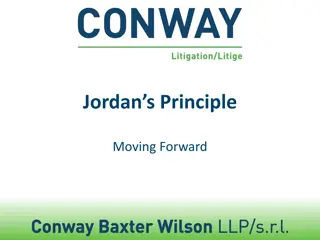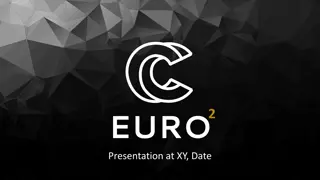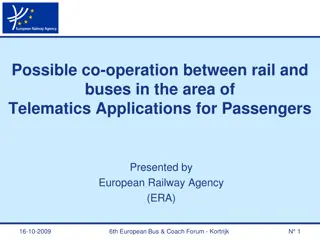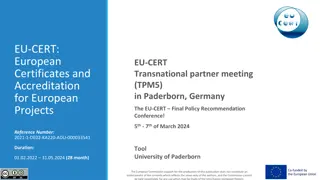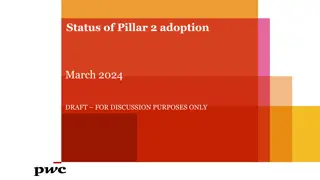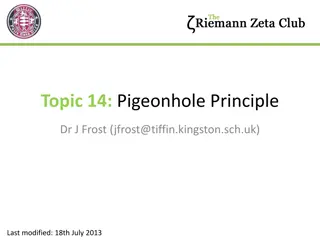Implementation Status of the Once-Only Principle in European Countries
Insights into the adoption and implementation of the Once-Only Principle (OOP) in European countries, including findings, strategies, initiatives, legislation, and establishment of authentic sources to support data reuse. The data showcases the progress made by various countries in implementing the OOP at national, regional, and local levels, highlighting the importance of legal frameworks and support for authentic data sources.
Download Presentation

Please find below an Image/Link to download the presentation.
The content on the website is provided AS IS for your information and personal use only. It may not be sold, licensed, or shared on other websites without obtaining consent from the author.If you encounter any issues during the download, it is possible that the publisher has removed the file from their server.
You are allowed to download the files provided on this website for personal or commercial use, subject to the condition that they are used lawfully. All files are the property of their respective owners.
The content on the website is provided AS IS for your information and personal use only. It may not be sold, licensed, or shared on other websites without obtaining consent from the author.
E N D
Presentation Transcript
The Once Only Principle and reuse of data in Luxembourg Gilles Feith Director, Government IT Centre
Agenda Key findings and conclusions of the European study on the Once Only principle conducted in the context of EUPAN Core eGovernment principles adopted by the Luxembourg Government Council and their implementation on the MyGuichet platform 2
Agenda Key findings and conclusions of the European study on the Once Only principle conducted in the context of EUPAN Core eGovernment principles adopted by the Luxembourg Government Council and their implementation on the MyGuichet platform 2
Has your country started to implement the OOP? IS* Out of a total of 33 European FI* countries, 25 countries have started to NO EE implement the OOP at national level. SE LV DK* LT* 7 of these 25 countries have started IE implementing it on both regional and UK* PL* NL DE* BE local levels. CZ LU SK AT LI HU FR* CH RO SI HR BG IT MK TR ES PT Implementing OOP GR Not implementing OOP CY MT 4
Is there a strategy/initiative for implementing the OOP in your country? IS Out of a total of 25 European countries: FI 16 have both a strategy & initiatives in NO place; EE SE 2 have only a strategy in place; and LV DK LT* 7 have only initiatives in place. IE UK PL NL DE BE CZ LU SK AT LI HU FR* CH RO SI Both a strategy & initiative(s) exist HR Only a strategy exists BG IT MK TR Only initiative(s) exist(s) ES PT GR No data available CY MT 5
Is there legislation that supports the implementation of the OOP in your country? IS Out of a total of 25 European countries, FI 13 have legislation supporting the NO implementation of the Once-only principle EE SE LV in place. DK LT IE UK PL NL DE BE CZ LU SK AT LI HU FR CH RO SI HR BG IT MK TR A piece of legislation exists ES PT GR No specific legislation CY No data available MT 6
Is there a law establishing authentic sources in your country? Number of answers 12 For each type of data, the establishment of related authentic sources is widely supported by a specific law. 10 8 6 Yes 11 10 No Don t know/No opinion 4 7 No answer 6 5 2 3 2 2 1 1 1 1 1 1 0 0 0 0 0 Note: An authentic source is a high quality database, accompanied by explicit guarantees ensuring its quality and that contains essential and/or frequently used data pertaining to persons, institutions, issues, activities or occurrences. Personal data related to citizens Identification data related to businesses Geographic (including address) data Fiscal/Financial data Health data 8
How does your country implement the consent of data subjects ? IS Explicit consent to be given FI Out of a total of 25 European countries, By law, no explicit consent needed NO Explicit consent to be given or imposed by law 10 countries apply the principle that EE explicit consent has to be given by the SE LV No answer data subjects before their data can be DK LT IE processed, whereas this processing is set UK PL NL DE by default by law in 6 other countries. BE Depending on the type of data, 4 CZ LU SK AT additional EU countries require the explicit LI HU FR CH RO SI consent of data subjects if the processing HR BG of those data is not imposed by law. IT MK TR ES PT GR CY MT 9 Source: Online questionnaire (KURT SALMON 2015), n=25
What are the main barriers to overcome in order to ensure the implementation of the OOP? Organisational barriers (21) Semantic barriers (16) Legal barriers (13) Technical barriers (9) Lack of resources Inconsistencies in data elements definition Specific provisions related to the processing of personal data Legacy systems Main barriers encountered Lack of willingness to share data with other administrations Different data models Lack of harmonisation of processes Establishment and promotion of common vocabularies No measures mentioned No measures mentioned Identification of information ownership Measures proposed Common strategy coordinated by one entity Other barriers mentioned: implementation costs related to the OOP and lack of budget. 9 Source: Online questionnaire (KURT SALMON 2015), n=25
What approach is currently used by your country to implement the OOP? Combination of both Front & Back-office integration Front-office integration Combination IS 1 Back-office integration (5%) Front-office integration FI Don t know/ No opinion N/A 3 11 NO (16%) (58%) EE SE LV 1 DK LT (5%) Other IE UK 3 PL NL DE (16%) BE Back-office integration CZ LU SK AT L I HU FR CH RO SI HR A combination of both Front and Back-office integration is BG IT used by a vast majority of countries to implement the OOP. In MK TR ES PT fact, this approach facilitates the different applications and GR related processes used to implement the OOP. CY MT 10
Agenda Key findings and conclusions of the European study on the Once Only principle conducted in the context of EUPAN Core eGovernment principles adopted by the Luxembourg Government Council and implementation on the MyGuichet platform 2
Towards a highly performant eAdministration Fundamental principles adopted in July 2015 by the Luxembourg Government Council: Digital by Default Transparency Once Only principle Right balance has to be found between administrative simplification and modernisation and data protection Trust is key!
MyGuichet platform Eco friendly Tracking Security Time gain Tailored dialog High availability Supporting document management
MyGuichet workflow Front Office Back Office Security Once Only (front office) Strong authentication Personal data consultation Administrative task Citizens & Businesses Pre filling Once Only (back office) Authentic sources Data entry Correctionrequest User consent eSign Processing Additional documents Admission Administrative request Transmission User consent Transparency Tracking Response
MyGuichet platform More APIs for databases or registers containing authentic sources will be implemented over time. Citizens & Businesses Security Data compartment Private Space Professional Spaces Front Office VAT balance sheet Taxi waiting list National Register Driving license Tax credit Data compartment eForms eForms Authentic sources Data compartment Data consultation Data consultation Tracking Tracking Data compartment Data compartment Authentic sources Office Back Back Office Security Administrations
Authentic sources - the main engine for OOP No need for users to provide supporting documents Compliant with data protection Users can access their data Data are compartmentalized in semantic units Users have the possibility to correct data that concerns them Increases the quality of government data 2
